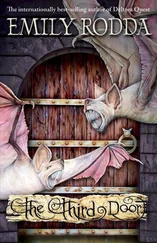Emily Rodda - The Golden Door
Здесь есть возможность читать онлайн «Emily Rodda - The Golden Door» весь текст электронной книги совершенно бесплатно (целиком полную версию без сокращений). В некоторых случаях можно слушать аудио, скачать через торрент в формате fb2 и присутствует краткое содержание. Год выпуска: 2012, Издательство: Scholastic Books, Жанр: Старинная литература, на английском языке. Описание произведения, (предисловие) а так же отзывы посетителей доступны на портале библиотеки ЛибКат.
- Название:The Golden Door
- Автор:
- Издательство:Scholastic Books
- Жанр:
- Год:2012
- ISBN:нет данных
- Рейтинг книги:4 / 5. Голосов: 1
-
Избранное:Добавить в избранное
- Отзывы:
-
Ваша оценка:
- 80
- 1
- 2
- 3
- 4
- 5
The Golden Door: краткое содержание, описание и аннотация
Предлагаем к чтению аннотацию, описание, краткое содержание или предисловие (зависит от того, что написал сам автор книги «The Golden Door»). Если вы не нашли необходимую информацию о книге — напишите в комментариях, мы постараемся отыскать её.
The Golden Door — читать онлайн бесплатно полную книгу (весь текст) целиком
Ниже представлен текст книги, разбитый по страницам. Система сохранения места последней прочитанной страницы, позволяет с удобством читать онлайн бесплатно книгу «The Golden Door», без необходимости каждый раз заново искать на чём Вы остановились. Поставьте закладку, и сможете в любой момент перейти на страницу, на которой закончили чтение.
Интервал:
Закладка:
Fate is strange, and our destinies can be shaped by very small decisions. If Rye had simply run home by the shortest way after leaving the healer’s house, the whole course of his life might have been very different. Possibly, as time passed, he would have been able to push Tallus’s disturbing words to the back of his mind and continue as before.
But he did not go home by the shortest way. Instead, upset and confused, he obeyed a sudden impulse to go home the long way, along the path beside the Wall trench.
Turning down the side road that led to the Wall path, passing houses reduced to rubble by skimmers, Rye told himself that it was sensible to avoid streets that by now would be thronged with people who would wonder why he was not at school.
But as he reached the path itself, and the Wall loomed before him, rising sheer into the clouds from the cavernous trench, he faced the truth. The Wall itself had drawn him.
The Wall of Weld had always been part of Rye’s life, yet now he gazed at it as if he had never seen it before. He stared, transfixed, at the workers swarming over the scaffold that crisscrossed the lower sections of the smooth, mud-brick surface.
They reminded him of bees crawling over a frame in one of Lisbeth’s beehives. They were so many that it was hard to see exactly what each one was doing. But each, Rye knew, had a special task and did it diligently, for the sake of Weld.
For the sake of the hive, Rye thought. And he stopped and looked back the way he had come, past the ruins of the side street, toward the row upon row of small, identical houses that stretched away from the trench as far as the eye could see.
He imagined the thousands of dutiful citizens working in and around those little houses, cleaning, mending, making, building, gathering food, caring for their young, without a thought of what might lie beyond their Wall. And again he thought of bees.
Then a faint sound broke through his thoughts. It was a tiny, piteous bleat — the sound of a very young creature in trouble.
If Rye had not been standing still, thinking about bees, he might have missed hearing the sound.
But he did hear it. And Rye was not one who could ignore the cry of a creature in distress.
So it was that he went searching. And so it was that at last he found, in a hole covered by a heap of rubble in one of the ruined houses, a baby goat. Somehow this baby alone had survived a skimmer attack that had wiped out its owners and its family. The stinking goat bones that lay scattered among the shattered bricks showed only too plainly what had happened to its mother and father.
When Rye had pulled away the rubble and lifted the little creature free, it bleated, and butted feebly at his chest. It had clearly been trapped for many days. It was very weak and almost dead of hunger and thirst.
The need to save it drove everything else from Rye’s mind. He found an old washing basket among the ruins and put the goat gently inside it. Then, clutching his burden, he made for home.
The goat was small, but Rye’s arms were aching by the time he pushed through the gate into his own back garden.
The bees were humming around their hives, and the bell tree’s lowest branches hung almost to the ground, weighed down by ripening fruit. Gratefully, Rye left the basket in the shade of the tree and let himself into the deserted house. Weld doors were never locked in the daytime. A locked door was, in fact, a shameful thing, because it was a sign that the householders had secrets to keep or did not trust their neighbors.
It took no time at all for Rye to warm some goat’s milk. It took much longer to coax the little goat to suck the milk, first from his fingers and then from a clean rag dipped into the bowl.
Only when all the milk was gone and the little animal had fallen asleep in its basket did Rye realize how tired he was. He left the basket where it was and went into the house.
The citizens of Weld did not sleep in the daytime unless they were very young, very old, or suffering from an illness, but Rye had had an almost sleepless night and an exhausting morning. The house was empty. There was no one to see what he did.
The urge to lie down on his bed was too strong to resist. He planned to close his eyes for just a little time, but the moment his head touched the pillow, he fell deeply asleep. And he did not wake.
If that day had been a day like any other, Lisbeth would have returned home from the square in the early afternoon. In skimmer season, most shoppers bought what they needed in the mornings. The afternoons were very slow, and most of the stallholders left the square not long after lunch.
But on this particular day, after she had closed her stall, Lisbeth decided to go and visit Crell’s mother, Ritta, before going home.
Why she did this, she could not afterward tell. Perhaps it was because she now wore two gold brooches, instead of one. Perhaps it was because she wanted to urge Ritta to rejoice that her son was safe, instead of feeling shamed because he had come creeping home. Perhaps she simply wanted to lose herself for a time in bittersweet memories of the days when Ritta’s husband and hers worked together on the Wall, when Dirk, Sholto, Crell, and Joliffe were schoolboys together, and when life was safe and unchanging.
Whatever the cause, she spent a long time drinking tea and talking to Ritta. She only realized how much time had slipped by when the end-of-work bell sounded. So it was that she hurried home very late, as the light began to fade. So it was that she burst through the front door very flurried, shouting for Rye, calling that they must seal the house quickly, quickly!
And Rye, woken with a shock from a sleep fathoms deep, leaped from his bed and ran to help her, still half caught in a vivid dream of Dirk peering down into a dark pit of stone.
He worked automatically, doing what he had done so often. His head felt as if it were stuffed with rags, but his hands knew what to do.
The house was secured just in time. His heart thudding, his hands stinking of skimmer repellent, Rye sank down at the table. Even now, the last shreds of his dream clouded his mind like spiderweb.
Only when the first flapping sounds of the skimmers began did he remember the baby goat in its basket beneath the bell tree.
With a thrill of horror, he heard a high, terrified bleating begin in the back garden.
“What is that?” Lisbeth hissed, turning from the fireplace. “What —?”
She froze as the sounds above the house abruptly ceased. It was as if the skimmers had suddenly paused in midair. There was a split second of silence pierced by another single plaintive bleat. And then there was a mighty flapping rush, and the awful sound of branches splintering under a great weight.
The little goat’s cries stopped almost at once. But having tasted blood, the skimmers began searching for more. In terror, Rye and Lisbeth clung together as claws raked the shutters of the little house, and bodies thudded like giant fists against the door.
The locks held. The rags soaked in skimmer repellent sealed every gap. Try as they might, the skimmers could not enter the house. But their frenzy became no less, and outside, in the garden, the sounds of tearing and smashing went on, and on, and on.

In the morning, Rye and Lisbeth opened their door on ruin. The bell tree was nothing but a jagged stump. Torn branches, the bright leaves already limp and fading, lay on the ground in a litter of gnawed golden fruit and fragile goat bones, picked clean.
The beehives had been reduced to splinters. A few bees that had survived the attack crawled aimlessly among the broken roots of the shredded honey hedge. Rye knew they would soon die. They could not live without their hive.
Читать дальшеИнтервал:
Закладка:
Похожие книги на «The Golden Door»
Представляем Вашему вниманию похожие книги на «The Golden Door» списком для выбора. Мы отобрали схожую по названию и смыслу литературу в надежде предоставить читателям больше вариантов отыскать новые, интересные, ещё непрочитанные произведения.
Обсуждение, отзывы о книге «The Golden Door» и просто собственные мнения читателей. Оставьте ваши комментарии, напишите, что Вы думаете о произведении, его смысле или главных героях. Укажите что конкретно понравилось, а что нет, и почему Вы так считаете.




